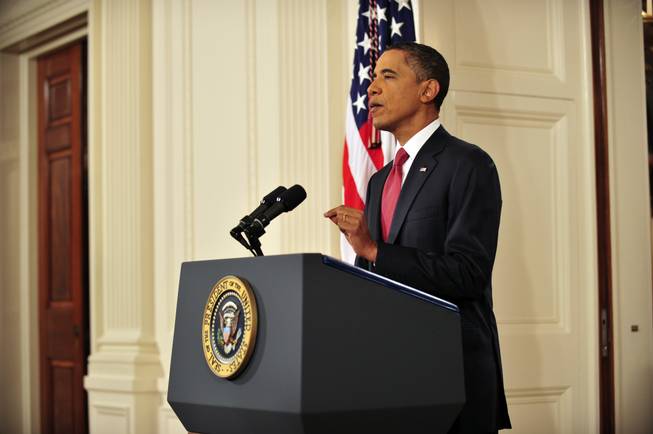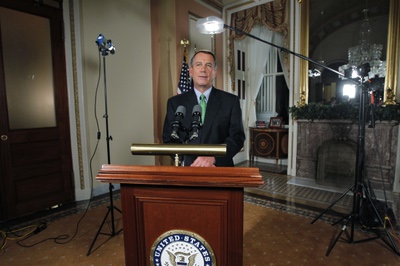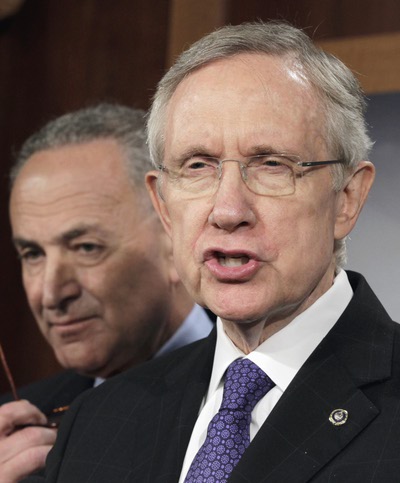
AP Photo/Jim Watson
President Barack Obama addresses the nation from the East Room of the White House in Washington, Monday, July 25, 2011, on the approaching debt limit deadline.
Monday, July 25, 2011 | 10:36 p.m.
Sun Coverage
President Barack Obama and House Speaker John Boehner both got to give their closing arguments for competing approaches to raise the debt limit Monday night.
Speaking from the East Room of the White House, President Obama gave his official endorsement to Sen. Harry Reid’s debt limit plan, channeling his signature compassionate academic style in a speech that was much a helpful primer to the nation on debt ceilings, financial markets and congressional budgets as it was a chance for him to frame the debate as a battle between right and wrong.
“The debate right now isn’t about whether we need to make tough choices ... the debate is about how it should be done,” Obama said. “Most Americans, regardless of political party, don’t understand how we can ask a senior citizen to pay more for her Medicare before we ask a corporate jet owner or the oil companies to give up tax breaks that other companies don’t get.
“That’s not right,” he continued. “It’s not fair.”
Boehner struck a much more forceful tone once it was his turn to put a spin on the standoff, assuming an outsider's stance to decry Washington’s runaway spending.
“Where most American businesses make the hard choices to pay their bills and live within their means, in Washington more spending and more debt is business as usual,” Boehner said. “I’ve got news for Washington: those days are over."
His speech was shorter than the President’s, but he also proportionally spent far less time talking about the deals on the table, using his minutes instead to give nods to the Republican-favored, but presently kaput “Cut, Cap and Balance” plan and parse for viewers his take on the president’s underlying agenda.
“The sad truth is that the president wanted a blank check six months ago, and he wants a blank check today,” Boehner said. “That is just not going to happen.”
Boehner and the President haven’t been doing so well since last Friday, when Boehner departed negotiations directly with the White House, complaining that Obama had moved the goalpost on him by demanding increased taxes at the last minute he couldn’t agree to.
Obama said when he tried to reach Boehner to discuss potential changes, he couldn’t get the Speaker to return his phone call for almost a full 24 hours, and that Boehner dropped out of talks instead of engaging in a conversation.
Having missed that opportunity to strike a "grand bargain" — a presumed $4 trillion deal that would have required Republicans and Democrats to compromise on the deeper questions of revenues and cuts that both plans on offer punt to a future time — Boehner and Obama are now doing their best to present their favored plans as the best and most bipartisan option.
It’s a bit of a stretch on either side.
Reid’s bill, which purports to cut $2.7 trillion from the budget to enable a $2.4 trillion hike to the debt limit, has the dogged support of Democrats, but has so far attracted only harsh accusations from Republicans, who say they want only a short-term increase, and accuse the President of playing politics for demanding a longer-term one.
Republicans point out that most of the debt ceiling hikes have been short-term ones, and the U.S. has never suffered for it. But in the past, short-term debt ceiling hikes weren’t leveraged with cuts, and the state of the economy is a complicating factor.
Credit agencies have already informed Congress that a short-term debt limit extension isn’t likely enough to keep them from downgrading the U.S.’s credit rating, a step that will lead to a hike in interest rates.
Meanwhile Boehner’s bill is essentially a repackaging of many the elements in the Cut, Cap and Balance framework, which only five House Democrats (out of 193) supported.
It lays out a two-step approach: the first, a $1 trillion hike in the debt limit, offset by $1.2 trillion in discretionary spending cuts; the second, a $1.6 trillion hike to the debt ceiling predicated on Congress approving $1.8 trillion in additional cuts, which will be recommended by a bipartisan Joint Commission of lawmakers. It also mandates a vote on the balanced budget amendment in both houses of Congress this year, but doesn’t require it pass.
Boehner maintained Monday night that “there is no stalemate in Congress. The House has passed a bill to raise the debt limit with bipartisan support, and this week ... we will pass another bill, one that was developed with the support of the bipartisan leadership of the U.S. Senate.”
But those Senate leaders aren’t taking kindly to Boehner’s approach. Senate Democratic leaders argued Monday that Boehner’s set-up was lot of smoke and mirrors, because all it guarantees is a six-month extension of the debt limit for the same set of discretionary spending cuts as are found in Reid’s proposal.
Most Republicans charge that Reid’s proposal, however, doesn’t pay for the rest of his proposed debt limit hike — enough to take the country to 2013 — with legitimate funds, since $1 trillion of the rest comes from war spending that everyone had been expecting to dwindle anyway, as the Iraq and Afghanistan operations are drawn down.
Both bills come to the floor mid-week, where the true test of their bipartisan mettle will be in the votes.
Already the House Democrats have decided, as a caucus, that they won’t be voting for Boehner’s plan.
As of late Monday, things weren’t looking so sure on the Republican side either.
Earlier Monday, the Cut, Cap and Balance Coalition — which includes 79 lawmakers — urged lawmakers not to support Boehner’s bill, because, they said, it sells out the core principles of the Republicans’ budget strategy.
“As we stated this morning, Cut, Cap and Balance is not merely a legislative framework, it is a series of principles,” the letter penned by the Coalition’s spokesman said. “Principles are not subject to negotiation.”
If those who have signed the Coalition’s pledge actually heed that advice, Republicans won’t be able to mass enough of a majority in the House to get it through — a failure that would likely help build momentum behind Reid, provided he can then convince seven Republicans in the Senate to support his plan.
The House has already committed to bringing its bill up on Wednesday. That’s also the earliest time the Senate could take an introductory, filibuster-proof vote on the bill; but Reid could also wait to see if the House measure fails first.
There’s only eight days to go.




Join the Discussion:
Check this out for a full explanation of our conversion to the LiveFyre commenting system and instructions on how to sign up for an account.
Full comments policy